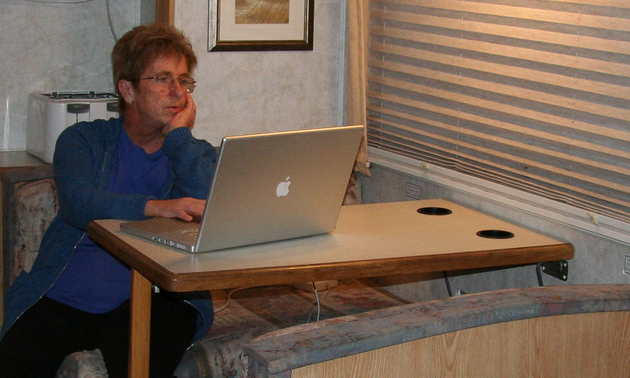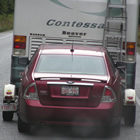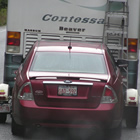PC or Mac? Which is better for RVers?
Ed Boothman has years of experience with computers, and he recommends a Macintosh

With today's technology most of us travel with a smartphone or laptop computer. A laptop or iPad can help us plan our trip or keep current on road conditions and weather. They can be a great tool for keeping in touch with family or watching a movie on a cold, rainy evening.
Of course you will need access to the internet, either through a data plan or counting on available Wi-Fi on your trip. In my travels I find many RV campsites offer free internet, but in most cases it so slow it is almost unusable. I recommend travelling with a good data plan. It will almost always be faster than the free Wi-Fi available. Make sure you understand the costs for data roaming, especially if you're travelling into the U.S.
PC or Mac?
Should you have a PC or a Macintosh for your personal computer?
Over the years I have met many who consider themselves experts in computers. It is almost like religion with some. Most have only experience using the Windows operating system, yet when you ask them about a Mac they have nothing positive to say.
While operating my IT business I was responsible for six PC work stations and two Mac work stations. I also maintained three Windows web servers. So I think I am qualified to have an opinion.
A few days ago I was in a computer store with a friend shopping for a computer. I asked the salesperson about a Mac. I could not believe the stuff that came out of his mouth. He had no Idea what he was talking about. But he was going to sell my friend a PC.
PC advantages
- They cost less, but that often turns out to be false economy.
- Now add the cost of virus and pop-up protection for the next three years.
- Now add the cost of the tech guy you need to pay to keep it running fast.
It seems like no matter what you do, by the time the computer is a year old it is running about half the speed it was when you bought it. In most cases, by the time the computer is three years old it is running so slow it is almost unusable.
To solve these problems I used a program called Ghost. As soon as I had a PC set up with all the needed software and network configuration, I would take a Ghost copy of the drive. When the computer started to slow down a few months later I would just recover from the Ghost copy and everything was working well again.
When you are buying the cheapest computer on the rack, there is a reason why it is the cheapest. There are many places where they can cut corners with low cost components. So if you are going to buy a PC, do not buy the cheapest.
Many like to stay with the PC because they are comfortable with the user interface. That is all going to change. Microsoft in its infinite wisdom has decided to change the user interface of its Windows 8 operating system. You will find it is nothing like what you're used to and there will be a steep learning curve.
If you are a tech person or have a tech friend you can call on when needed, you may want to stay with your PC. Owning a computer should not be an endless source of expense and frustration.
Now let me tell you about the Mac
In the 20 years I have used Macintosh computers, I have never needed or installed virus protection. Is it possible for a mac to get a virus? Yes, but it is very unlikely.
The MacBook Pro I bought almost five years ago still runs as good as the day I bought it. As upgrades to the operating system become available, I install them. It should be noted that a new version of the Mac operating system costs a fraction of what a Windows upgrade is. The last upgraded OS I installed cost me $20 and it gave me the rights to install on all the Macs I own.
If you feel you need the Windows operating system to run that program that only works in Windows, you can install it on a partition on the Mac. That will allow you to boot your Mac as a Windows computer when needed. Even if you get hit by a virus on the Windows side, it will have no effect on the Mac OS. I consider virus protection on a Mac a waste of money.
I could go on and on about the advantages of a Mac, but I would probably put you to sleep.
Unfortunately most people buying a computer do not have the technical knowledge needed and rely on the recommendation of the store salesperson.
Assess your needs
If all you use a computer for is surfing the web, emailing, photos and family communication, all you need is an iPad. But even here you need to stick with Apple. There are now many companies building iPad like devices; however, they do not offer the safety of the Apple walled garden. Apple will not allow any application to be installed in their operating systems until they have approved it. There are ways to get around this, but the Apple installer will warn you.
I am sure I will hear from a few PC lovers, and they should stay with Microsoft as long as they are happy. But as far as I am concerned, if you have a solid understanding of both operating systems the choice is easy.
Technical stuff
The Windows OS is simply an expanded version of DOS. Every upgrade is simply more code added to the previous operating system. They are building for hundreds of different hardware configurations and they are motivated to have you want to buy the latest version every few years.
The Mac operating system is built on the Unix OS. Unix is the OS used on large mainframe computer systems and is considered the most secure operating system in the world.
Apple is in the hardware business and builds its operating system to help sell its hardware. They want you to buy new hardware every few years. But it should be noted the new OS releases will work on previous generations of hardware without the need to upgrade.
I hope this will help you understand the differences between the two operating systems and help you with your next computer choice.
About viruses
There are currently over a million known viruses for the PC. There are no known viruses for a Mac. In the past, on the very rare occasions a virus threatens the Mac, Apple quickly puts out a software update blocking the virus.
The vast majority of virus hits come from email. In most cases they look like they are coming from a trusted friend. Never accept the sender name as being that trusted friend. The email will arrive with an attachment or link that looks normal. You might even launch the attachment thinking it was fine, but without you knowing it has harvested all of your contact emails and all of your friends will get this great deal that they think you have sent them.
Some will say it will never happen to me because I keep my virus protection up to date. Check the following scenarios:
Example one:
A few weeks ago I got an email with a virus attachment from Ken. I had not heard from him in almost a year. My wife got the same email because she was in his contacts list. I emailed him telling him what happened and he told me that was impossible because his virus protection was up to date. He soon realized he had a problem and changed all of his passwords and contacted his bank to ensure nothing unusual was going on.
It is not easy to spot a scam email masked as coming from your friend. Even with my experience I opened the one that I thought came from Ken. The only thing that saved me was the fact that I was using a Mac.
Example two
While I was running my IT business, we got a phone call from one of our customers in northern Alberta claiming that we had just sent him a virus. I asked him for details. He told me he had received an email from us claiming that we had discovered a virus on his system and he needed to launch the attached application to clean up his system. He dutifully launched the application and it proceeded to do the things that viruses do. He was not very happy, but we had nothing to do with it.
Here is how this one worked: the bad guys have robots that scan the internet looking for website hosting companies and their customers. Once the robot has accumulated the data, the sender composes the needed message and has his computer send out millions of emails with a stolen sender address.
Example three: phishing
Phishing is the act of attempting to acquire information such as usernames, passwords and credit card details (and sometimes, indirectly, money) by masquerading as a trustworthy entity in an electronic communication.
Here is an example of phishing: You get an email from your bank suggesting there is a problem with the address in your account. In the email they ask you to log in to your account to confirm your address information by clicking on the link they have included. The link takes you to a page that looks just like your bank log-in page. You quickly input your username and password and hit enter. The page appears to refresh and loads your bank’s real log-in page. You think you must have incorrectly typed your password, so you put it in again. You then see the addressing information is correct. They have now harvested the username and password to your bank account and you have no idea it happened.
So I must again say, never accept the sender address as correct and be very wary of links included in emails.








